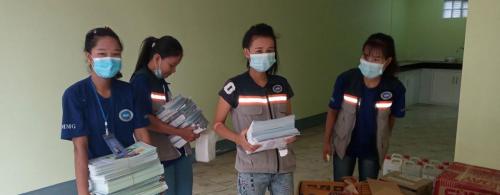First Person: supporting migrants on the COVID-19 frontline in Myanmar
One of the far-reaching effects of the global lockdown brought on the COVID-19 pandemic has been the return of migrant workers to their home countries. The UN gender agency, UN Women has been supporting the authorities in Myanmar, under the EU–UN funded Spotlight Initiative, to provide for the needs of women.

Volunteers at work in the quarantine facility on the Thai border with Myanmar.
Myanmar has been preparing for the return of hundreds of thousands of workers – some 650,000 are in Thailand alone – and one of the key tasks was to set up quarantine facilities for those returning migrants. Sandi Swe, who has been working in a quarantine facility since March 2020, shared her experience with UN News.
April should have been a month of festivities, celebrating Thingyan – the Burmese New Year – but this year has been unlike any other, because of the measures Myanmar has taken to curb COVID-19. As the news of the global pandemic spread, Myanmar’s migrant workers began to return home, and the country has prepared for mass returns by providing safe quarantine facilities.
Many were established in the border town of Myawaddy, in Kayin State; men and women sheltered in different facilities, and I volunteered to support women migrant returnees.
I work for a local Myawaddy-based organization, Migrant Monitoring Group (MMG) and, before the pandemic, I had provided awareness-raising training to migrants. I decided to volunteer, even though I was worried, because it didn’t feel right to let fear get in the way. It was simple: everyone needed help, and I could provide that help.
I started working in the quarantine facility in March and at the beginning, I admit, I took this pandemic very lighly. But day by day, month by month, it is still here. The protective measures are becoming part of our daily routine and we can’t even guess when it will be over.
The number of migrants decreased significantly in the last few months, so aside from cleaning the facilities, we were not that busy and I thought this pandemic was almost over: until now, that is. The rate of return is increasing again, and 100 to 200 migrants are arriving every day.
In the minds of many people, the issue of migration and returning migrants has been linked to COVID-19. This job has allowed me to understand the migrants at a deeper level, the challenges they face currently, their anxieties about the present and the future. I believe I understand their situation more clearly and I certainly feel empathy for them. I want to support these people.
It feels good when they ask me for my help, when people need me, especially since I know I can be of assistance and make a difference.
Empowered by helping others
Before the pandemic, I didn’t have any experience of this type of work, but the fact remains that nothing could have prepared me or anyone else for this global emergency.
I have found time to contemplate how the job empowered me and enriched my life, emotionally, physically and mentally. I have more energy now, and I have to learn to take care of myself and my health, especially if I am to provide more help to others. Before COVID-19, I stayed home most of the time, but working in this environment has shown me that I like to work with other people.
I pray every day for the pandemic to end quickly. I know I am okay, and it has not affected me too much, but there are others who have lost income and opportunities. I pray for them as well.
Source:United Nations
- 254 reads
Human Rights
Ringing FOWPAL’s Peace Bell for the World:Nobel Peace Prize Laureates’ Visions and Actions

Protecting the World’s Cultural Diversity for a Sustainable Future

The Peace Bell Resonates at the 27th Eurasian Economic Summit

Declaration of World Day of the Power of Hope Endorsed by People in 158 Nations

Puppet Show I International Friendship Day 2020

